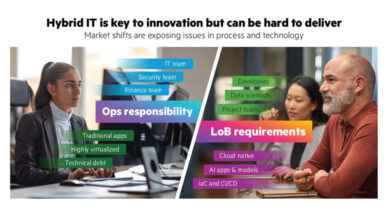Government investment in cloud computing
 Peter Cheney summarises the Government’s plans to support cloud computing, as it emerges as a promising economic sector.
Peter Cheney summarises the Government’s plans to support cloud computing, as it emerges as a promising economic sector.
Action on developing Ireland’s cloud computing sector is accelerating after a year of intensive policy work in government. The Programme for Government pledged to make Ireland a leader in cloud computing through four specific actions:
• promoting greater use of cloud computing in the public sector;
• organising existing state supports for cloud computing into a package to promote Ireland as “a progressive place for IT investment”;
• establishing an expert group to address “new security and privacy issues” arising from the use of cloud computing; and
• reviewing the adequacy of current legislation and identify what steps need to be taken to ensure a supportive regulatory environment.
The Government’s first cloud computing initiative (Cloud4Gov) was launched on 13 February this year, through a partnership between EMC and IDA Ireland. Both organisations will construct a cloud data centre for government
(i.e. a private cloud), linked into hubs in departments and EMC’s centre of excellence in Cork.
“This platform will remove the upfront IT cost and infrastructure barriers, and provide a unique opportunity for companies to develop and showcase their new applications using datasets from public sector organisations,” EMC country manager Jason Ward said at the launch. “It’s built for trust. In terms of outside access, or the data floating around, that isn’t a possibility.”
The testing platform has been made available at no cost to the public purse, and procurement of cloud-related infrastructure and applications will take place as and when required. Its basic infrastructure, the Vblock, has been developed by EMC, VMware and Cisco, and security has been built in by EMC’s security division, RSA.
Small firms can then use the EMC private cloud in Cork to develop applications for the public sector and business markets.
The Brookings Institution and US-based consultancy Gartner estimate that g-cloud services could halve government IT expenditure, although EMC is anticipating a 25 per cent annual saving in Ireland. The Government does not publish an overall IT bill but 2011 expenditure for the Department of Finance and Department of Public Expenditure and Reform alone was €49.5 million.
Communications Minister Pat Rabbitte added that Ireland’s “strong international telecoms connectivity and energy infrastructure, together with an environment that is conducive to hosting data centres” gave it a unique selling point as a hub for cloud computing.
Within government, the Department of Public Expenditure and Reform is developing the cloud computing strategy for the public service, to be published this month. A pilot project will also go ahead this year but the department expects migration to the cloud to be “a multi-year process that will become an integral part of strategic ICT planning and implementation in the public service.”
The Department of Jobs, Enterprise and Innovation formed a high level working group on cloud computing in 2011, which is considering security, pirvacy and legislation. It will report “shortly”. The IDA is seeking to attract cloud computing and data centre services to Ireland and (with Enterprise Ireland) is also establishing a ‘cloud computing competence centre’ to promote greater investment.
Broadband falls into the Department of Communications, Energy and Natural Resources’ remit and support programmes have included the Metropolitan Area Networks, the National Broadband Scheme, the Rural Broadband Scheme, 100MBps to Schools initiative, and the Global Crossing and Project Kelvin international connectivity projects; the latter two have enabled the development of data centres.
The Next Generation Broadband Task Force’s draft report, published in May, pointed out that the “availability of high speed broadband will enable the most advanced uses of cloud computing technology all across Ireland and deliver additional jobs and investment from global corporations.”
Skills
The Department of Education and Skills was asked to incorporate cloud computing needs into the ICT skills action plan, launched in January with strong industry support.
A departmental spokeswoman has pointed out that four of the 17 existing ICT skills conversion programmes (at Level 8 higher diploma) are in cloud technologies. Also, 11 of the 65 Springboard ICT programmes (providing part-time and flexible higher education for unemployed people) covered cloud computing and technologies, and Springboard’s future expansion will have a strong ICT emphasis.
Jobs, Enterprise and Innovation Minister Richard Bruton’s cloud computing implementation group is chaired by his Secretary General, John Murphy. It also includes members from the Department of Jobs, Enterprise and Innovation, the Department of Communications, Energy and Natural Resources, the Department of Public Expenditure and Reform, the Department of Justice and Equality, the Office of the Data Protection Commissioner, Forfás, IDA Ireland, Enterprise Ireland and Science Foundation Ireland.
On 2 April this year, Minister Bruton also launched the ‘cloud computing technology research centre’ with a €1.2 million initial programme (lasting 12 months).
Four principal research areas have been identified by a group of Enterprise Ireland and IDA Ireland client companies, looking ahead over the next three to five years:
• cloud computing technology architecture, including design, configuration and operation;
• service management;
• business research; and
• cloud security.
The research centre is led by DCU and comprises University College Cork and Athlone Institute of Technology, with input from the Innovation Value Institute at NUI Maynooth. The centre will work with a group of Enterprise Ireland’s software clients to establish how best to generate business and profit from the cloud.





